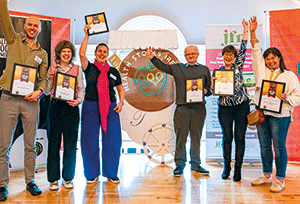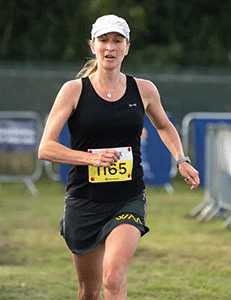Rude Health News & Events
The latest news, research and events from the world of natural health

Health food retailers celebrate awards success
The New Natural Business/Health Stores Ireland Retailer Awards 2025 were announced in January at the Health Stores Ireland annual conference in Shannon. The worthy winners were as follows:
- Merchandising & Window Display: Nature’s Cures, Skerries, Co Dublin
- Community Engagement: Natural Health Store, Wexford
- Training: Evergreen Health Foods, Galway
- Environmental Initiatives: Organico Health Food Shop, Bantry
- Digital Marketing & Social Media: The Hopsack, Dublin
- Local Producer Champion: Sonas Health Foods, Newcastle West
Congratulations to everyone from the team here at Rude Health magazine!

What’s in season?
Butterhead lettuce, Brussels sprouts, carrot, cabbage, cauliflower, leeks, mushrooms, onions, parsnips, potatoes, spinach, swede, turnip, cooking and eating apples.

‘Non-industrialised’ style diet may reduce chronic disease risk
Researchers from University College Cork have developed a diet based on the eating habits of non-industrialised societies, which has significantly reduced the risk of several chronic diseases.
The study was led by Professor Jens Walter from University College Cork and was based on Prof Walter’s previous research into the eating habits of people in rural Papua New Guinea. This information was used to design the new NiMeTM diet.
In just three weeks, participants following the NiMe diet experienced weight loss, decreased their bad cholesterol by 17%, reduced their blood sugar by 6% and reduced their levels of C-reactive Protein (a marker of inflammation and heart disease) by 14%. These improvements were linked to beneficial changes in the participants’ gut microbiomes.
Prof Walter’s team found people in rural Papua New Guinea have a much more diverse microbiome, enriched in bacteria that thrive from dietary fibre, and with lower levels of pro-inflammatory bacteria that are linked to the Western diet.
The NiMe diet is primarily made up of vegetables, legumes, and other whole-plant foods but includes one small serving of animal protein per day (salmon, chicken, or pork). It contains no dairy, beef or wheat, is very low in processed foods and is rich in fibre.
The findings were published in the scientific journal Cell.

Marathon effort
Rude Health editor Liz Parry provides an update on how her training is going for the Dublin marathon
Well, this is the second instalment of my marathon training diary! Dublin Marathon takes place in October this year, so I’m still in the base training stage. The idea behind this is to get myself into a regular running routine so that when I start my 20-week training programme I should be all fired up and ready to go!
For the past six weeks I’ve been focusing on heart rate training in Zone 2. The goal is to build endurance and cardiovascular fitness by keeping my heart rate low – but it’s proving to be a challenge. Slowing down and incorporating more walking breaks feels counterintuitive, and my runs are taking longer than usual. But patience is key!
Nutrition has become a major focus too. I’m ensuring I fuel properly with healthy carbohydrates before runs and protein-packed meals afterward to aid recovery. Speaking of recovery, I’ve introduced foam rolling into my routine – definitely a love-hate relationship, as it can be quite painful at times! Epsom salt baths have also been a game-changer for soothing sore muscles. I’ve been contemplating the idea of ice baths for recovery but I’m not quite brave enough to try them yet.
As I continue on this journey, I’d love to hear from Rude Health readers. Have you trained for a marathon before? What worked for you? If you have any top tips – whether it’s pacing strategies, recovery hacks, or mental tricks to stay motivated – please send them my way!
Training for 26.2 miles is no small feat, but with the right approach (and plenty of support), I’m determined to get to that finish line.

New computer model could revolutionise gut health
Researchers from the University of Galway have created a database featuring the world’s largest collection of digital microbes. It is hoped that this will revolutionise our understanding of the human microbiome and its impact on our health.
Spanning multiple continents, age groups and body sites, APOLLO is the most extensive computational model collection of the human microbiome created to date.
The database will mean that scientists can use software to study how microbes function within the human body and interact with health and disease, to accelerate new health discoveries. Computer simulations can predict how an individual’s microbiome interacts with their diet, medications, and health conditions, which could lead to tailored treatments that optimise gut health.
Dr Cyrille Thinnes, project scientist, said: “Our microbiome plays crucial roles in digestion, immune function, and overall health. Studying these microbes is essential for understanding how they influence various conditions, from gut health to neurological diseases.” The research was published in Cell Systems.

New cacao supplement developed by Irish researchers
Researchers from Queen’s University Belfast have developed a unique supplement based on cacao, Greek honey and vitamin D3, which helps to support the immune system.
Greek honey contains thyme and asfaka (Greek sage), which have strong antimicrobial, antioxidant and anti-inflammatory properties. Asfaka contains phenolic compounds that protect against oxidative stress and microbial infections, and may help inflammatory diseases such as arthritis.
The new supplement was made using 3D printing technology, and the research team hopes this will offer a new way to produce nutrient-rich supplements tailored to individual needs. The research was published in Current Research in Food Science.
March events
March
Limerick Holistic Fair
2 March, Castletroy Park Hotel, Dublin Rd, Limerick
www.mindbodyexperience.ie/limerick-holistic-fair-about
The 50 Plus Show
13–14 March, RDS, Merrion Road, Ballsbridge, Dublin 4
www.seniortimes.ie
Find more natural health events here...
Sign up for our e-newsletter here and get your favourite health read delivered direct to your inbox